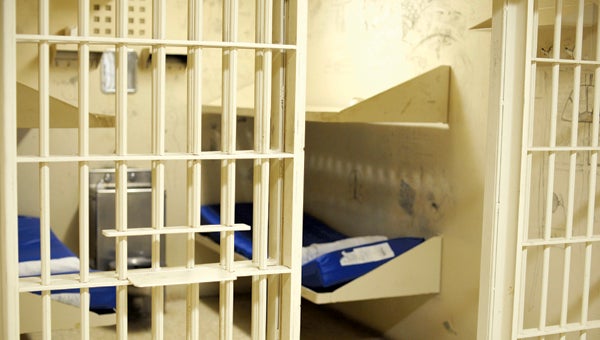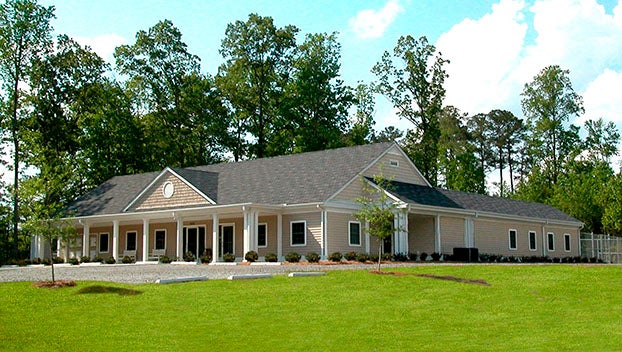Top 10 of 2014: To build, or not–new Beaufort County jail a hot issue in 2014
Published 12:13 pm Monday, December 29, 2014

VAIL STEWART RUMLEY | DAILY NEWS
TO BUILD OR NOT TO BUILD: One of the hottest issues in 2014 was the debate over whether or not to build a new public safety facility in Chocowinity’s Industrial Park Complex.
In 2014, attempts by a faction of Beaufort County Board of Commissioners moved forward plans to build a new public safety facility, only to have them halted at the last commissioners’ meeting of the year. The story of a new Beaufort County jail is the No. 5 story of the year.
In 2014, the issue of building a new public safety facility raised hackles and inspired community activism, pitted Beaufort County Commissioners against one another and saw the USDA deny a request for funding for the facility.
In January, 4-3 vote to authorize county staff to negotiate contracts related to building a new jail started the year. At the regular meeting, County Manager Randell Woodruff and other county staff were instructed to negotiate a contract with Moseley Architects for architectural services related to building a new jail/sheriff’s office facility. The Board also instructed county staff to negotiate a contract with MB Kahn to provide construction-management services for the project. As in previous jail negotiations, the vote was split between those in favor of building a new facility (Chairman Jerry Langley and commissioners Robert Belcher, Ed Booth and Al Klemm) and those against (commissioners Gary Brinn, Stan Deatherage and Hood Richardson), largely along party lines — the Democrats and Klemm for; Republicans, against.
In February, a special-called meeting upped the temperature of an already heated topic, when another 4-3 approved the two contracts: a $1.64 million contract to Mosely Architects for basic services related to designing a jail and a contract for the first phase of a two-phase contract to MB Kahn for construction-management services related to building a new jail. The approval met with objections from Brinn, Deatherage and Richardson, who called it “a fool’s folly,” and spurred accusations of rushing into the contracts to ensure the process was already in place before coming elections could change the course for the Board.
By this time, the community was getting involved, largely in the form of the “Stop the Jail” committee, a group led by Chocowinity resident Harold Smith and Beaufort County Republican Party Chairman Keith Kidwell. The committee maintained that a new jail wasn’t necessary — with sufficient updates, the existing jail meets state standards, and a $22 million facility would only serve to raise tax rates for county residents. Committee members argued that an investment of that much taxpayer money requires a referendum: the people should decide.
In June, the decision to build a new public safety facility in Chocowinity met with resistance again, this time at a Town of Chocowinity public hearing. In order to potentially accommodate a new jail, the town had to amend its Industrial Park zoning. The decision to make the change passed, 4-0. The action led members of the “Stop the Jail” committee to file a lawsuit claiming the Town of Chocowinity and its board of commissioners violated North Carolina’s open meetings law at the June 3 public hearing, as town officials had ample warning about the number of people who would be attending, yet chose not to move the hearing to a larger venue so that everyone present could participate simultaneously. Because fire regulations dictated the regular meeting room at Town Hall could only hold 24 people, many waited outside and in the building’s hallway for their turn to speak. Keith Mason, Chocowinity’s town attorney, maintained there was no violation of the open meetings law: anyone in attendance at the hearing was given the opportunity to sign up to speak; the names of those who signed up were called several times and all those who had signed up did speak, with the exception of one person who had left the premises. The suit was later retracted.
In July, commissioners began the process of finding funding for the new facility, starting with a USDA loan of $18 million to be paid back over a 40-year span. But another public hearing led USDA State Director Randall A. Gore to decline funding the project without a bond requirement, due to the lack of “significant community support” and the “current contentious nature of the project.”
The USDA decision not to back the project did not serve as a deterrent for long. In August, Assistant County Manager Jim Chrisman was tasked with finding the best option and cost for financing the project and found two other options: limited obligation bonds and private bank loans, both of which would use the facility as collateral and required a shorter period for which to make payments on the loan. Later in the month, however, a meeting between commissioners and the Local Government Commission — an agency established to approve certain types of financial agreements involving local governments and to help counties, cities and other local taxing units set up and maintain their financial and accounting systems — put a hold on the process.
“No public financing or debt can be incurred by a local government without LGC approval, which is a division of the State Treasurer’s office,” Chrisman said at the time. “The LGC gave us feedback in regard to the project.”
LGC feedback included the board having to meet certain requirements before it would accept a loan application for the project — the main one, waiting until after the county commissioners’ upcoming election, which would in effect serve as a referendum, as pro-public safety facility Commissioner Al Klemm had declined to run for a third term, Commissioner Ed Booth, a Democrat, was up for reelection and longtime Commissioner Stan Deatherage did not make it out of a Republican-heavy primary earlier in the year.
The prospect of a new jail — to halt or continue the process — became a primary issue in the run up to the election, and on Election Day, Ed Booth retained his seat, while two new Republican commissioners were elected: Frankie Waters and Ron Buzzeo. The addition of the two Republicans, both of which had stated opposition to or misgivings about a new facility, led many to believe the first order of business at the next commissioners’ meeting would be putting a stop to the jail, once and for all.
But on Nov. 30, the day before the meeting in which the newly elected would be sworn into office, an inmate at the Beaufort County jail committed suicide by hanging himself. William Gares, 37, was found dead in a single-cell inside of the jail’s E-block. Gares had tied a blanket from one bar to another to create a screen so none of the other inmates could see inside the cell, and despite regular checks by guards of all the cellblocks, in addition to sporadic checks, it was the jail’s narrow confines and lack of clear visuals of inmates that prevented detention officers from knowing what was happening, according to jail superintendent Capt. Catrena Ross.
The SBI was called in to investigate and at the Commissioners’ meeting the next night, rather than put a complete end to a new jail, commissioners voted to put a halt to all spending on the planning of the facility, instead. Until commissioners have a chance to review the SBI report and talk to Superior Court Judge Wayland Sermons Jr., who issued the court order that became a driving force behind fixing the existing jail and exploring options for a new one, it was decided that further action would be postponed.





